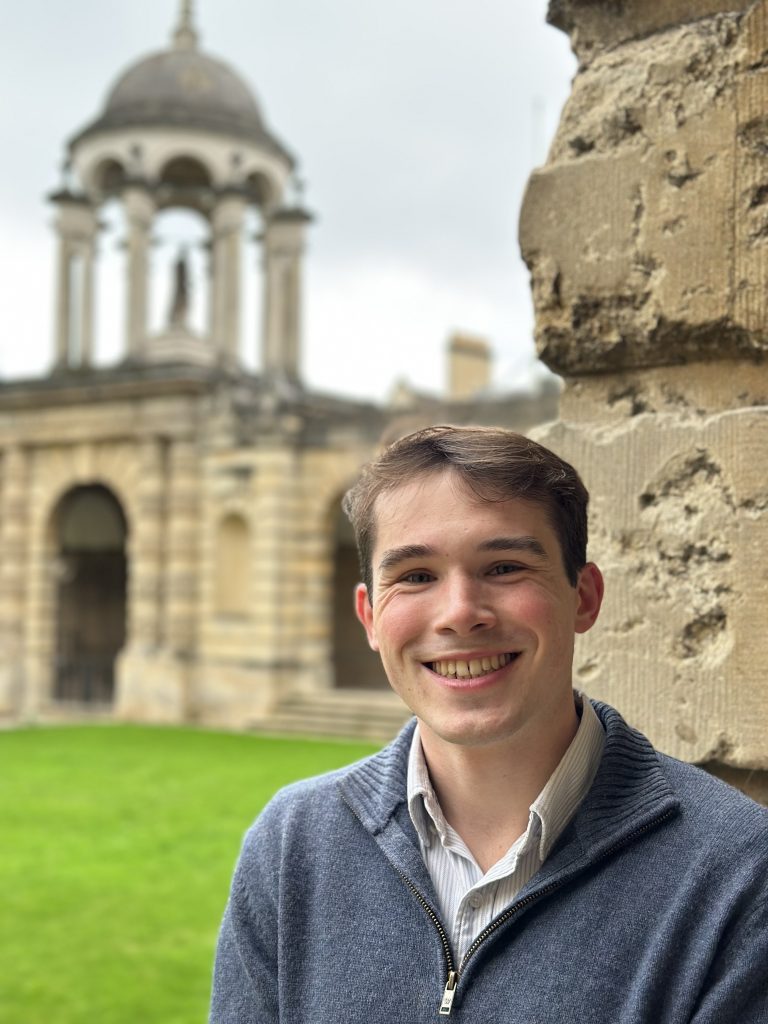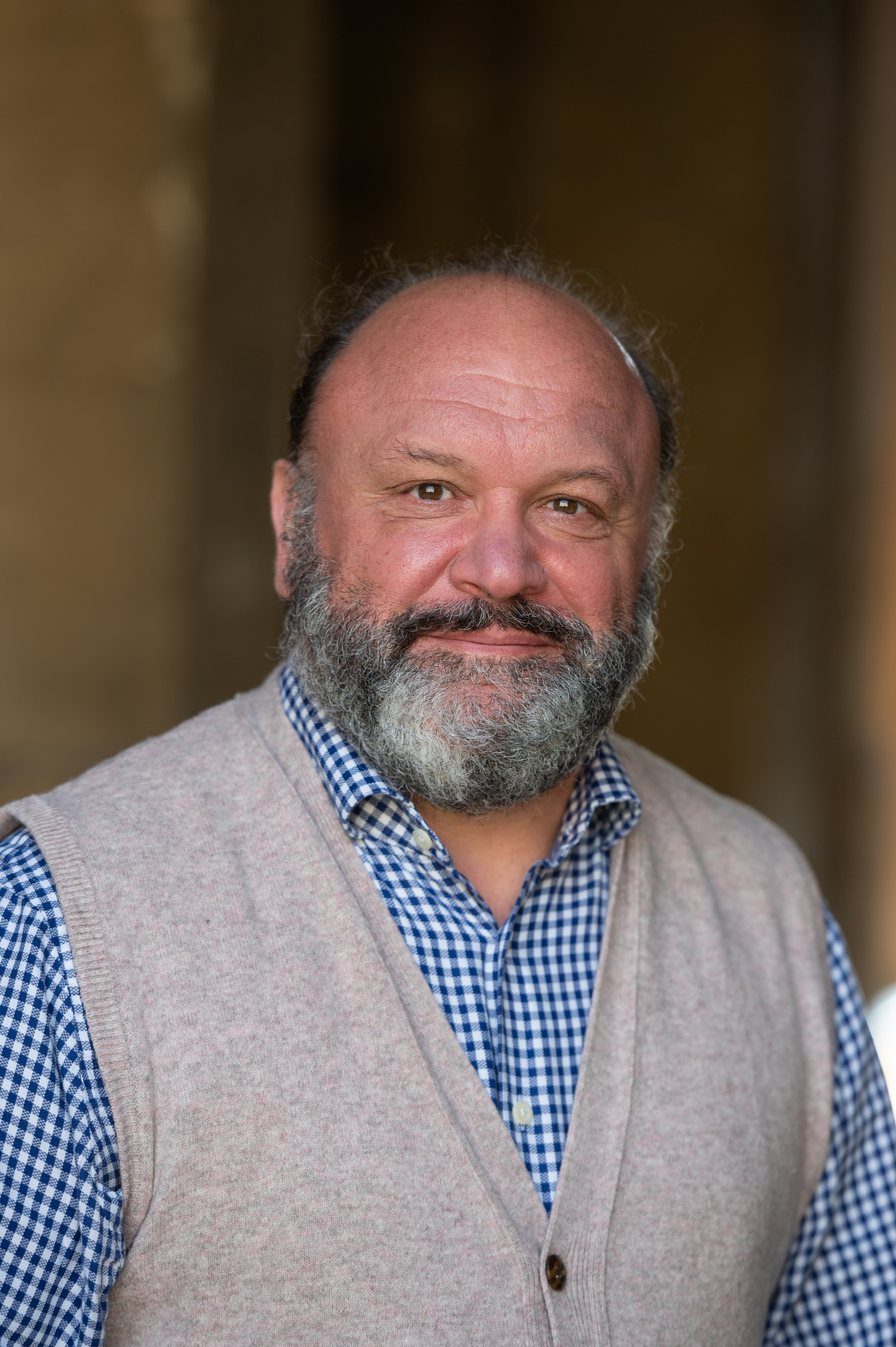Congratulations to Daniel Kelly (Mathematics, 2021) who has been awarded the Gibbs Prize for excellent performance in the Part C Mathematics Dissertation & IMA Prize for excellent performance in the Final Honour School of Mathematics (Part C). We asked Dan to tell us what first drew him to mathematics and what it’s like studying at Queen’s.
What first drew you to study Maths, and how has your interest evolved since arriving at Queen’s?
For a start, I was very lucky in school to have teachers who were happy to support me in exploring mathematics beyond what you would usually see at this stage. Being encouraged to continually push the boundaries of my understanding definitely drew me in, and I began to see the subject as the creative and investigative pursuit that it is. It wasn’t just a progression of ever-increasingly complicated calculations, which perhaps is how it sometimes seems.
Being encouraged to continually push the boundaries of my understanding definitely drew me in, and I began to see the subject as the creative and investigative pursuit that it is.
In particular, I think there is something quite unique to the subject about the precise control you have over the claims that you make and the certainty this gives you about your conclusions. If you have ever played a sudoku, or some game like this, you know that you can always decide in the end whether you are right or wrong. And you can know this for sure because you know exactly the rules of the game that you are playing, so you simply check that you are fulfilling each requirement. Someone could disagree with you about the rules themselves, but it isn’t possible to disagree with the statement that “if these are the rules, then my solution is correct”.
Mathematics is not dissimilar. Because we often work in a completely abstract framework, it is possible to be completely precise about exactly the set of “rules” you choose for your problem. This means once you’ve proven a result in mathematics, it can’t transpire that there’s actually some additional, conflicting piece of information. This would be another rule in the game. You might then decide you want to add new rules, or not, but this doesn’t negate what you have previously claimed, because you are always very clear about what you do and don’t assume.
Conceptually, I liked that you might escape this cycle of hypothesis, experiment and re-evaluation that you have in many fields. With this I suppose the objective is to determine the rules themselves out in the real world, a game which you don’t get to control! In this sense maths is a lot more straightforward, you can set your own rules.
Mathematics can provide deep insights into real phenomena.
However, even in its abstract formulation, it is somehow the case that mathematics can provide deep insights into real phenomena. I think while studying at Queen’s I have become increasingly interested in this aspect of the subject. How can we apply the results which we develop in the abstract in order to draw inferences about the world? But also the converse, how can observation about the real world guide our mathematical intuition even in abstract frameworks?
Could you tell us a bit about your dissertation topic? Do you see connections between the mathematical theory you study and the wider world?
When we model systems in the real world, we can think about the objects of interest as a collection of “particles” which move around in some “space”, according to some underlying “mechanism”. These could represent people in a crowd trying to avoid colliding with each other, cells in a biological tissue which are drawn to some chemical substance, or stock prices in a market reacting to buying and selling trends. However, even across very diverse applications, many systems of this kind can be viewed as undergoing the same characteristic behaviour. They follow a process called a “gradient flow”.
A way to think about this is to imagine hiking up a mountain at night. You would like to find the summit but you’re not able to see far enough to know where this is, so you don’t have “global” knowledge of the landscape around you. However, you can see enough of your nearby surroundings to determine which direction leads up and which down. So given this “local” knowledge, a reasonable strategy would be to just always head in the direction of steepest incline. You can’t guarantee that this will be the shortest path to the summit, but you can generally be sure that it will get you there eventually if you make some assumptions about the landscape, for example that there aren’t two summits.
Slightly more abstractly, the “landscape” in this scenario is the graph of a function with two variables. The function being the height of the mountain and the variables your position, say in longitude and latitude. This “gradient flow” strategy is then a means by we try to find the maximum of the function, even when we can’t say exactly where this is. We simply move in the direction which increases the function the fastest, following the steepest gradient.
The punchline to this story is that, in some sense, the systems which I mentioned before are doing an analogous process as they evolve in time. There is some underlying function of the state of the system, a landscape of many variables corresponding to the many particles, but nonetheless which the system tries to maximize. However, the system doesn’t have a “global understanding” of what this function looks like. It only knows, for its current state, which small “local” adjustment will increase the value of the function the fastest. That is, it understands how to follow the steepest gradient, and so this is precisely what it does.
What did you find most challenging or surprising in your research?
Often when you are working with quite abstract ideas you make some simplifications in order to give you something comprehensible, maybe you can even visualise an image in your mind. This allows you to get some intuition for the problem at hand and the kind of behaviour which you might expect. Nonetheless when the time comes to actually prove the thing that you have decided is probably true in its full generality, it’s not uncommon for some of these simplifications to reappear in challenging, and often surprising ways!
So there were a number of these surprises over the course of the project, something that I had assumed didn’t really make much difference to the overall theory turned out to be completely vital. One example was the importance of the curvature in your underlying space. Relating to the hiking analogy, it would be something like if you removed the mountain from the landscape, should you think of the ground by itself as being completely flat, or being curved? In any case, this ends up being very important and the way in which you treat the flat case doesn’t exactly extend to the curved setting. So it is often seemingly minor things like this where you don’t see the significance at the outset, but in hindsight the importance becomes very obvious.
It is often seemingly minor things like this where you don’t see the significance at the outset, but in hindsight the importance becomes very obvious.
What’s the Maths community like at Queen’s?
It is fantastic, both academically and otherwise! The undergraduate mathematics degree at Oxford is of course very challenging, and you really do need to have a strong network of support in order to make the most of it. For me this was always centred around the College, be that the other undergraduate students for day-to-day discussions about lecture courses and problem sheets, postgraduate students who could offer informal advice with a more experienced perspective, or mentorship from College tutors though both the structured tutorial system and just casual discussions. Also in a non-academic capacity, some of my fondest memories of my undergraduate degree are with my fellow Queen’s mathematicians. So it has definitely been a brilliant community to be a part of.
I was also fortunate that my field of interest aligned with the research activity of a number of tutors and postgraduate students at Queen’s. So members of the College have been incredibly supportive for me to pursue additional mathematical projects, which may not have transpired without having already developed this connection. There is also no doubt for me that the readiness of the community at Queen’s to offer this additional support influenced my area of interest in the first place. So I personally have a lot to be grateful to the College for!
What advice would you give to prospective students thinking about applying for Maths at Queen’s?
Of course that they absolutely should, both in applying for maths and to Queen’s!
But also, and I think this is generally true for studying mathematics at university, it helps when you are solving a problem to really interrogate exactly what you are assuming at each step. Are you really justified in doing some algebraic manipulation or making some logical inference, and how can you be sure? I would say that asking these kinds of questions is the main difference between doing maths in school and at university, and it is definitely a skill which takes practice so it’s good to start early. But rest assured you’ll have plenty of time to get used to it during your degree, and beyond. I know I definitely still am!
It helps when you are solving a problem to really interrogate exactly what you are assuming at each step.



